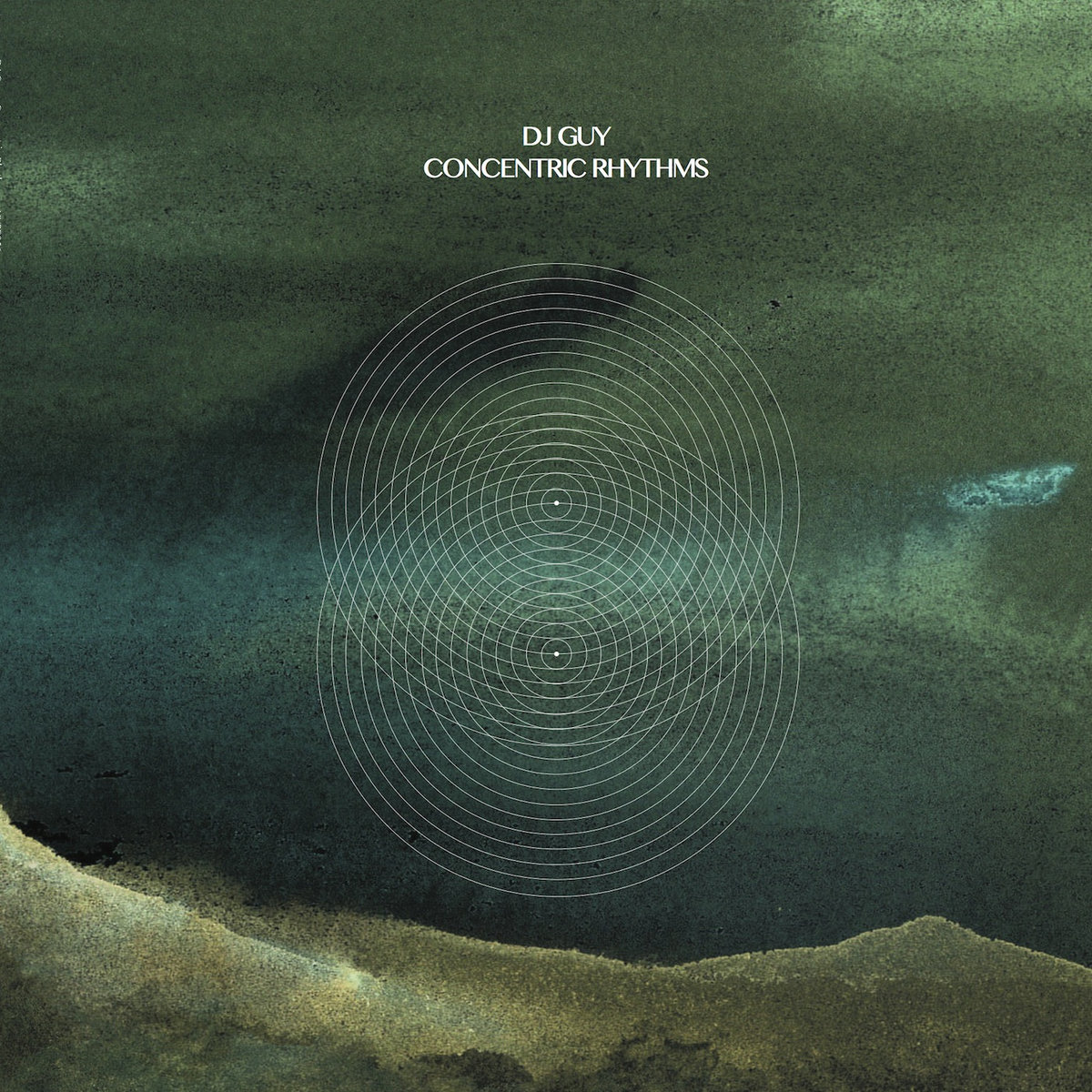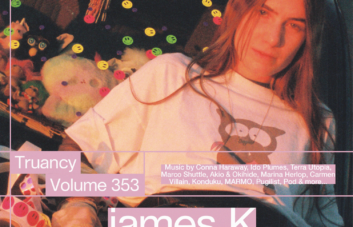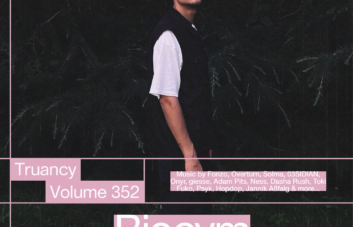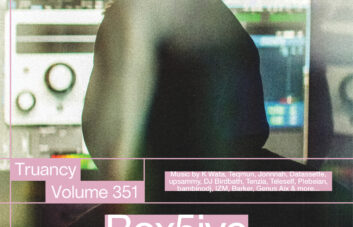Despite a lengthy DJing career in his native Wales throughout the 1990s and early 2000s, DJ Guy came to wider, international prominence with a release on All Caps in 2014. He had been sharing cuts from his archive on Bandcamp and SoundCloud, and these were noticed by Glasgow’s Bake, who put out three scuzzy techno tracks recorded in the 90s (one featured in our summer crew mix from that year). The release showed an inventive approach that, with hindsight, felt like outsider house two decades early. Since then he’s gone on to release more of his archived work on labels such as Crisis Urbana, NORD, Cejero and Organic Analogue, who put out a wonderful package featuring a 12″ of new music alongside a tape of 90s tracks and a booklet featuring a lengthy interview with journalist Oli Warwick. Another release is due this month, this time on Hypercolour. It’s a mix of old and new, with tracks recorded two decades apart, yet showing the same innovative and inquisitive approach. Ahead of this release we had a lengthy chat with Guy about fitting music into the parenting lifestyle, the lasting effect of the Grassroots studio in Cardiff and how sometimes it can take nearly 30 years to ID a track.
How have you been lately? “It’s a massive change having a child, a complete change in priorities. Music is secondary now, as hard as that is to say! He’s number one priority in my life at the minute, and it’s slightly frustrating not having as much time as previously to work on music, but I think I’m trying to be more focused now on the time I’ve got. I mean I’m always changing my work process; I haven’t got a set way of making tracks. I’ve been making music quite a long time, and I don’t want to do the same stuff I was doing 20 years ago. It’s taken me a while to get to where I am now, where I’ve taken all the good stuff about the stuff I used to make back then,
“The All Caps record – I’ve got to say a massive thanks to Bake from All Caps – he was just such an inspiration to me. When we first started chatting on Skype, I used to send him stuff and he’d have a really good insight, really good feedback. Three tracks made it on to the All Caps record, through that whole time I must have sent him 150 tracks, it was a really good working relationship. I’m so grateful to have the opportunity to put it on All Caps, I’ll never lose how grateful I am to have that, I think a lot of the stuff that’s come since then is down to that really.”
There was a big build-up to the release on Organic Analogue – maybe that’s because it was kind of a big project – and then all of a sudden the Hypercolour thing happened so quickly. “Generally, when you speak to a label, it’s going to be 18 months, maybe longer, to get a record out. Hypercolour, they were interested quite a while back, and I was like “nah I’m putting this record out on Organic Analogue, that’s just it”. I was really happy with the previous stuff they’d released, and it’s a really strange one with Hypercolour, I wasn’t expecting that. I had a gig in Copenhagen in September, and I just saw Juno Plus and Resident Advisor were mentioning the record, and I hadn’t expected it to be out in the press that soon! I didn’t want to lose the opportunity to put it out on Hypercolour, they’re a big label. The stuff they’ve done with Luke Vibert has always been a really big inspiration to me. It has come out quickly, but there’s nothing wrong with that. The Organic Analogue release, I was so happy with that, I mean Benedetta and Nate, from Organic Analogue, they’re so passionate about what they do, putting the tape out and the vinyl, and Benedetta is such a great designer.” It’s quite a young label, but everything has been really good so far. “I know, their first release had the remix from one of the guys from Drexciya, and Gifted & Blessed did the remix on the second release, absolutely brilliant, I love their stuff. That came out in June, and the Hypercolour record is scheduled for October. I didn’t think it would come out this year! It’s out of my hands.
“There’s a track from the All Caps record on it. I chatted to Jamie [Russell, Hypercolour boss] and he was really interested in putting that out and I was like “sorry, that’s been released already on my first release”. We chatted for quite a while, and I said actually I’ve got a 16-minute full-length version which I think is a completely different track in a sense – it’s not a six-minute edited version, it’s basically the way I recorded it, it’s a jam. I think the edited version works as well, but it’s nice to give people an insight to the jam session the All Caps record originated from.
“The Hypercolour record has maybe three tracks I recorded in 93, 95, 96, and all the other stuff is stuff I did prior to the All Caps release coming out. It’s an interesting period. The track entitled “3”, that’s kind of broken beat I guess, I was experimenting really, to a degree, just doing whatever I felt like. Also the last track on the record, “Bankzappa Dub”, is kind of a strange amalgamation of footwork, dubby elements, ambient elements as well. I sent them a load of stuff and I’ve got a lot of stuff I’ve made from that period. The “Untitled 3” track, there’s a period of tracks, it was maybe after I’d been speaking to Bake and the All Caps record hadn’t come out, I was just getting back into remaking stuff really. I think if people go on my Soundcloud they can hear “Untitled 1” and “Untitled 2”.
I was reading some of the older stuff, particularly the interview that was on Juno Plus, and also the booklet that came with the Organic Analogue thing. You talk about the Grassroots studio, and I was wondering if you could tell me a bit more about that? “That was such an important part of my life. Grassroots is basically a community youth project, and it’s based in Charles Street in Cardiff. It’s actually still going. It had some funding difficulties recently and they did a crowdfunding campaign, and everyone from Super Furry Animals, Manic Street Preachers donated equipment or money, I donated money as well, it’s a really great cause, they raised £5,000 to keep the studio running. I first started going there; I was maybe 18 years old. I started DJing in clubs when I was like 17, probably in 1990. I was making music at home prior to that, but the first time I went to Grassroots was the first time I’d seen an Atari ST sequencer, and it was completely different to the sequencer I was using. I was using an Amiga computer with OctaMED, and it’s a strange way of making music – if you’ve ever seen videos on YouTube, it’s like a sample tracker, it’s very different to the sequencers you get nowadays. Going to Grassroots was a real eye opener, they had a really great studio, good mixing desk, they had a few keyboards, they had an FZ-1 sampler, just amazing stuff.
“I used to volunteer there, 16 hours a week, and get an afternoon free myself, and ending up just hanging out there all the time basically. That led on to being employed there full time. Every day was different. I worked with quite a few people who’ve released records, I’d help them in any way I could. Established producers would come down and I’d just patch stuff together so they could mix stuff down. It was amazing experience, being at that age, I feel I haven’t changed that much in terms of wanting to make music, but at the time it was just amazing being surrounded by so many people. I can’t say enough good things about Grassroots. My job at the minute is teaching music workshops to young people, I work freelance, and I do a lot of work with Barnardo’s, charities like that, I just think it’s really important. For me personally, music’s been such a great art form to try and work with, just to create something you’re proud of.”
You predominantly make techno and electronic music, but in Grassroots, would there be lots of other kinds of music? So you’d be working on everything? “Yeah I worked in the studio and next door there was a jam room, a drum setup and keyboards and amps, so a lot of the time I’d be setting up equipment for other people, sometimes I’d do live recording. Both rooms were linked so you could just patch stuff through to the mixing desk, but it was mainly hip-hop producers, people doing electronic stuff, later jungle and drum & bass stuff. I’ve always been interested in making all kinds of music. The stuff I’m doing now is kind of different to the Hypercolour release. Having a baby, my time is limited, and I’m trying to be more focused, and I’m happy with where I’m at now.”
The Organic Analogue tape has got such a range of stuff, the particular sounds I noticed were whale noises and ambient sounds, as well as sounds like UNKLE or Leftfield, that track “Steppa Phase” in particular. “I think that track was like 97, I was experimenting with different stuff, I’ve never done one type of music, just different tempos, and working with a lot of hip-hop producers in Grassroots as well, was a big influence on me at the time.” What was it like acquiring music back then? Half my life I’ve had the internet, so I’ve had everything at my fingertips, but there was a time when I used to read Ministry magazine and Muzik magazine and all these tracks I wouldn’t hear them, I’d read about them for months or even years, so what was it like back then as a DJ and as someone making music? “Well just word of mouth! Going back to the early 90s, it’d take you months and months to find track names, you’d be lucky if you heard that track in a record shop, or you knew a DJ that was playing it and you’d be able to see what the record was called – unless you just try and describe a record in detail! I literally found a record three days ago that I’ve been searching for since 1988. It’s by Aqua Regia, it’s the guy who used to run Irdial. I heard it on John Peel in 1988 when a friend gave me this tape, and I’ve been searching for it ever since! I heard it on a Mixcloud mix a year ago, and I finally found this tune I was looking for for so long! Finding music was always difficult, now it’s just incredible with Shazam and the internet.”
What’s your setup now? “I’m using a 24 channel mixing desk with six auxiliary effect sends. A few rack-mount effect units, and a couple of guitar effect pedals. I’m also using an old E-mu ESI-4000 with lots of sample banks, a laptop and soundcard with 10 outputs and various plugins. I also have an old four-track tape machine, mainly used to transfer old tapes. Also any synths and stuff I can borrow from friends from time to time. I don’t really have a set way of doing things, but I’m quite happy with the setup I’ve got now.” And do you still jam? When you’re making music do you jam away and see what happens? “I made a track last night in about three hours, which is really quite strange for me, because I usually spend a lot longer on tracks. I’m quite happy with the result. Just trying to work a bit faster. All the old stuff I used to, they were recorded really quickly. I think it’s good not to overthink stuff when you’re making music. You can instinctively know what the outcome should be I guess. I’ve recently been getting into modular synthesis for the first time, it’s really interesting trying to piece things together, I still have lots to learn!
“Quite often I’ll look at something in so much detail I miss the overall picture. It’s good to have feedback off friends. Always run it by people to listen to and stuff. Even DJing now – I probably taught myself to DJ in the mid-80s, and even now it’s a constant learning thing. You always have to try your best, I never become complacent, I always get as much enjoyment now as I did when I first started mixing records. You never know what’s going to happen when you mix two records together, I always find that fascinating. It’s always throwing up new ideas.”
One of the things from the Juno interview was that you worked a lot on the craft of DJing, in terms of locking in mixes etc, and there was a line about how you went to see big-name DJs and their mixes would be off. “Maybe once or twice! Not every big-name DJ. I was DJing for years in my bedroom before I DJed in a club, and I’d do mixtapes for friends; I always assumed would be really, really high. I guess it was for a lot, but one or two… I don’t generalise.” The reason I mention that is that it ties in with what I said earlier about hearing tracks, if you want to hear a DJ now, there’s a Boiler Room or there’s a SoundCloud mix, whereas back then there was none of this, you could only hear the DJ you if you saw the DJ. “I still use vinyl. I’ve got Serato and I think with vinyl it’s so open, you can hear every kind of, if you touch the record slightly you can hear that, whereas with Serato you can speed it up quite a lot and cause the pitch is locked you don’t hear a slur on the record. I just love mixing with vinyl, I’m not a purist or anything like that, I think Serato’s got its place, playing stuff you can’t get pressed” And not lugging your collection around! “Funnily enough I DJed in Copenhagen and I got asked going through customs twice why my bag was so heavy! I had a suitcase half full of records and my hand luggage, a big rucksack full of records as well. Too many records.”
The Undisco EP came up and I was wondering if that’s available anywhere? “I spoke to a friend of mine last week actually, he distributed a few of the records in London when it came out, and Undisco is a friend of mine called Josh [Saunders] and I think he’s got some left! I’ll have to ask him. I’ve got a copy. I think he only pressed maybe 100. Apparently two people own it on Discogs and you’re one of them. “Right! That was a great opportunity. I think Josh was doing a music degree at the time and he put two tracks on it, great tracks, I still play his track out now and again.” That was the only thing you released before All Caps? “I had a track, a demo, on a cover CD for Future Music mag, back in 94 I guess.”
You had those remixes for Super Furry Animals as well, as Force Unknown? “I know Dafydd and Guto quite well, they used to come to Grassroots and we used to jam, and I’d see Cian quite a lot, and I bumped into him one day and he was like “do you want to do some remixes?” and I was like “yeah okay!” And later that day he came over to my house with four CDs, each with multitracks of one song, like “here’s the tracks” – he literally said: “Do what you want with it.” Those remixes are like nothing I’ve ever made before, kind of slowed-down tempo, just seeing how I could complement the band. I’m still quite proud of what I did there, I didn’t follow any set idea. I still listen to them. It was released on DVD and it was such a great thing. I think it was the first album released on and I was really grateful for the opportunity. It was the Rings Around The World album. And I did three remixes. Whenever I see them I’m like “thanks a lot!” They’re so talented and they’re the most down to earth people you’ll ever meet.”
You mentioned possible collaborations or releases with Elmono and MGUN, and I was just wondering if anything was happening there? “I speak to Manuel [MGUN] now and again, he’s had a baby girl actually. I haven’t spoken to him that much, obviously I’ve got my son as well. Just time seems to be whizzing by. I still see Joel, Elmono, him and Stagga have a really nice studio in Cardiff so I pop down there whenever I can, but I haven’t been down there for a little while. We were making some stuff, and definitely we will do that in the future but I’ve just not really had a huge amount of time. I’d love to do some collaboration with people. I might get in touch with Manuel and send him some beats, it would be great to have some ideas off him. I’ve always really admired his stuff.” He’s kind of like yourself in that he’s got a wide range of styles that he can tap in and out of. “I’m constantly impressed with the music he’s making, I bought his album straight away when it came out. Every track was great. And he’s always been a big admirer of my music, which I’m really flattered by. Since I first put my stuff on Soundcloud, he’s given me some good feedback. It really spurred me on to keep making more stuff.”
You said that you DJed weekly until about 2003, what happened there? “I never really stopped, I was doing a lot of stuff, when I finished DJing around that time, I think it was maybe 2001, my father became terminally ill, which was a really difficult time. My father was a big inspiration to me, he was a jazz/blues guitarist, and I was DJing a lot with High Contrast and that whole drum & bass scene was exploding, I just needed to take a bit of a step back really. Try and spend more time producing stuff, listening to all kinds of stuff. There was no real reason; it’s good to have a pause. I’m not resident DJ anywhere at the minute, though I’ve got a gig in Cardiff on October 28, and I’m playing in Bristol, The Island, on November 4 with Batu.
“I never plan a set. I think planning your record box is the nearest thing to planning a set, but I never know what I’m going to play first. When I’m DJing I generally pull out roughly what I might be playing next, you try and plan one or two records ahead maybe, but I like the excitement of not knowing what you’re going to do. You surprise yourself with mixes that happen. I really enjoy that aspect of it. I used to teach DJing to young kids quite a lot with an organisation called Community Music Wales. We’d go to parks, set up decks and teach kids mixing. And I’d be like: “You’ve got 10 records, and you’ve got one record, and you can mix that with the other nine and make it sound different each time.” I think that’s totally true, the idea of blending two songs together and seeing what can happen. They’re like tools really.”




